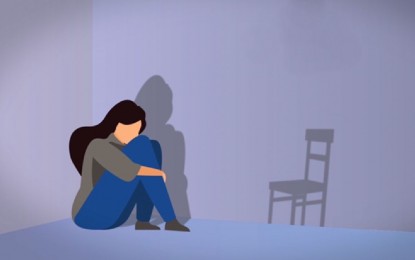
MANILA – The coronavirus disease (Covid-19) pandemic has upended the lives of everyone in ways unimaginable. It has affected not only the working class hit hard by pandemic shutdowns but also the youth.
Jennie (not her real name), 20, never imagined herself being depressed and seeking psychiatric help.
These are scenes she said she would only see in the movies.
She said she used to be jolly, friendly, sociable, and talkative whenever she is with her friends, but the stay-at-home orders imposed due to the coronavirus pandemic changed her.
She would experience sleepless nights, nightmares, panic attacks, and would sometimes lose her appetite and focus.
“Overthinker po ako. Parang konting bagay iniisip ko na kaagad kaya ang parang nangyayari hindi ako makapag-focus kasi wala akong magawa within the home, parang nabuburyong, na bo-bored kasi as a teenager parang gusto naming laging nasa labas (I am an overthinker. It's like I think a lot over little things and so I cannot focus because I cannot do anything inside our house. I became really bored because as a teenager, I always want to go out),” Jennie said.
‘It was nothing at first’
In the early days of the quarantine rules, Jennie said she was coping well with boredom.
The regular face-to-face classes were canceled and they switched to online learning.
As days became months, she started to feel different in a way that she can neither explain nor understand.
“Hindi ko siya napansin nung una pero nung parang wala na kaming magawa within the home, yun, hindi ko alam kung sakin lang siya me effect pero parang stressful siya in a way na hindi ko na alam gagawin ko, parang hindi ko na alam pano mag-focus (it never bothered me at first, it's just that we could not do anything about it at home, then the days became stressful. I don’t know what to do and I don’t know how to focus),” she said.
Jennie said she tried to divert her attention.
She played online games, read books, watched movies online but lose interest in them after some time.
Everything became just so boring and annoying, she said.
When anxiety strikes out of the blue, she said she loses control of herself.
“Pag umaatake anxiety hindi ako makapag focus, like pag gagawa ako ng school works, parang bigla na lang akong kinakabahan, parang yung me presentation or report ka sa harap ng classroom na lahat sila parang nakatingin sa’yo (when anxiety strikes, I lose my focus. It’s like in the middle of doing schoolwork, I become too nervous. It’s the feeling you have when you are reporting in front of a class. All eyes are on you),” Jennie said.
She said it came to a point when she couldn’t breathe anymore.
Opening up
Jennie then decided to tell her parents about how she feels. They told her it was normal, it was nothing and advised her to make herself busy.
The little changes, she said, started to become obvious when her grandparents started noticing her crying more often, sometimes even in the middle of the night.
“Nakikita nila na may changes sa’kin. Dati kasi nung nag-start ito, una akala lang namin na nagpa-palpitate ako dahil sa kape kasi mahilig talaga ako sa kape parang everyday nakakatatlong beses ako dati, pero dumating sa point na every time na nafi-feel ko na ina-anxiety ako, kailangan ko siya i-release through crying tapos everyday siya nangyayari, nang walang dahilan (They started noticing the changes in me. At first, we thought that my palpitations were due to coffee since I drink three cups a day. But it came to a point that I felt the need to release my anxiety and so I would cry every day),” she said.
She said she only feels relieved every time she cries.
Seeking professional help
Then her parents, she said, decided to bring her to a psychiatrist to seek professional help.
The psychiatrist said she has depression.
“Nung nagpa-check ako ang sabi kasi ng doctor is yun nga may depression ako, dati kasi nung di ko pa alam, bago pa yung releasing through crying ang ginagawa ko is nagka-cut ako ng wrist, napunta po sa ganon na point tapos di ko alam na ginagawa ko pala yon, pero that time nung ginagawa ko siya parang umo-okay ako, dumating sa point na ganon (The doctor said I have depression. Before my checkup, even before the ‘crying to release’ situation, what I do is I cut my wrist. I came to that point that I was already doing that because it makes me feel okay),” Jennie said.
The doctor has prescribed some anti-depressant medicines and told her to visit the clinic regularly.
Currently, Jennie said her doctor served like her “human diary” and makes her realize and explain things and situations she could not understand.
Hotline calls
The National Center for Mental Health (NCMH) in September said there has been a significant increase in monthly hotline calls regarding depression, with numbers rising from 80 calls in the pre-lockdown days to nearly 400.
NCMH data show that globally, the most vulnerable age group is 15-29.
In case you know of someone who is in the same situation, the NCMH said it helps to let them know that they are not alone and that you care for them.
It is also important that someone is with them in case they are in immediate danger.
The NCMH has a 24/7 NCMH Crisis Hotline 1553. The agency can also be reached through 0917 899 8727(USAP), and/or 7-989-8727 (USAP) in case someone needs to seek professional help. (PNA)
